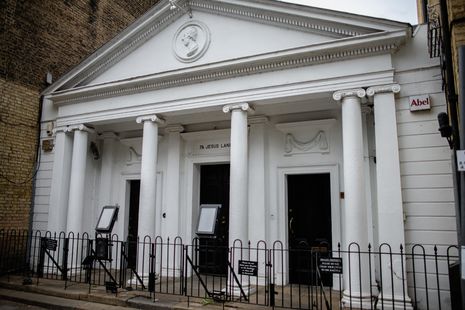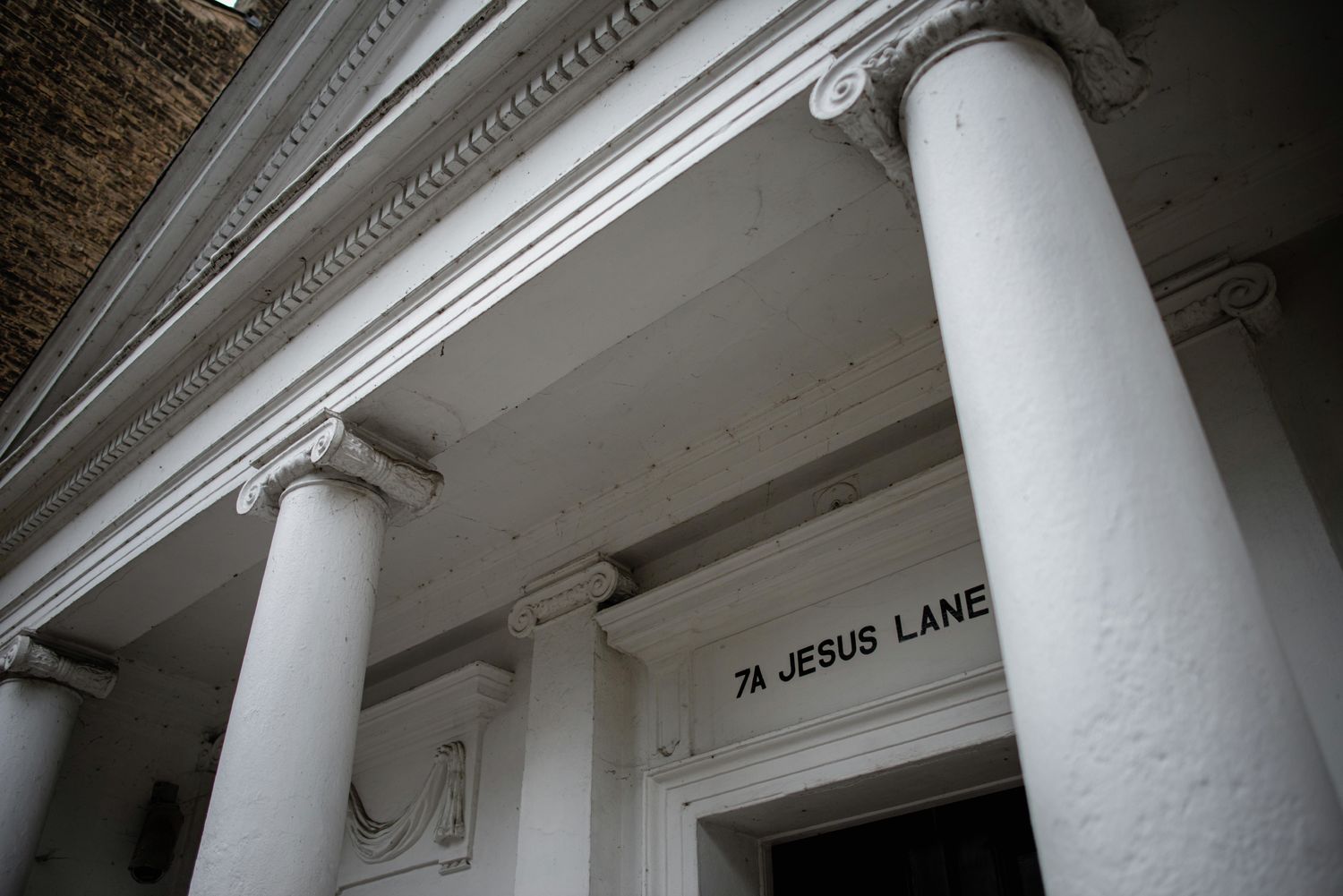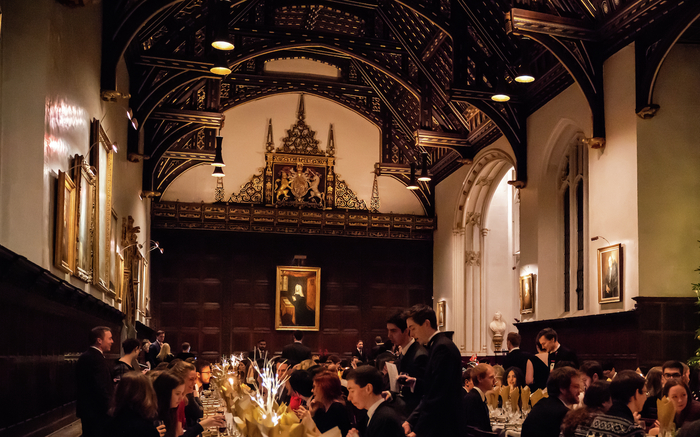It’s the Pitt Club’s spring party. The theme is “The Ecstatic and The Erotic”. Organisers are making sure all phone cameras are taped over, curtailing the risk of any photos getting leaked to the press.
“Given the amount of the lingerie and religious dress on display, [this] was very much needed,” this Pitt Club insider tells me. “Brilliant night.”
For someone who recognises the Club’s reputation as “a bunch of toffs getting together and being pricks,” this former Pitt Club committee member is anything but.
Generous with his time, freewheeling with his anecdotes and good company, his unassuming character is at odds with Cambridge’s collective perception of its most famous secret society.
Founded in Michaelmas term of 1835, the Pitt Club or “Club” – as its members affectionately call it – has a client roster even London’s most exclusive private members’ club would envy.
Past members include Tom Hiddleston, Eddie Redmayne, John Cleese, the (now former) chancellor of the exchequer and the King. “We now occupy No 11 and Buckingham Palace,” my source observes wryly.
‘We now occupy No 11 and Buckingham Palace’
Plagued by its association with its truant older brother in Oxford – though I’m vehemently assured they “are nothing like them”– the Club maintains a reputation for initiating only the privileged and publicly educated.
“They are very different beasts,” he says of his Bullingdon brothers. “We have no desire to smash things up.” Not least because they actually have their own premises in 7a Jesus Lane, albeit one they have to share with their tenants Pizza Express below.
He argues that the greatest disservice done in recent years to the Club’s Bullingdon associations was the 2014 film, The Riot Club. “Because I think everyone off the back of that kind of just made the classic Bullingdon/Pitt Club association, which is a very unfortunate one.”
As for the accusation of private school elitism often levelled against the Club, his answer is considered: “like many aspects of university life there is a lot of public and private school presence, but in no way shape or form is it ever considered a criteria.”
Has the Club’s membership evolved? My source thinks so. “There is a recognition that a better club is one with a breadth and diversity of people in it,” he says. “There really has been a significant amount of change in that record.” He reckons that women now make up 40% of the Club, claiming with greater certainty that a quarter of the membership aren’t white.
‘There is a recognition that a better club is one with a breadth and diversity of people in it’
This change equally extends to the highest echelons of the society. “There have been a number of people in the committee and in very senior positions in the club who do not conform at all to the stereotypical background.”
“So what is the criteria for suitability?” I ask. He pauses for thought, aware that everything he says is student journo gold dust. “I’m thinking how much I can give away here.”

Crucially, the secretive element of the club is still incredibly important. “The existence of mystery is a wonderful thing,” he explains. “As an individual at least I am a big believer in the value of ritual, mystery and symbolism, it’s a fun aspect of people’s lives.”
Admission into the Club, however, has its foundation in one simple principle: “you [should] be able to be sat next to anyone at a dinner you’ve never met before and make interesting conversation.”
Oh, and being a Blue helps. “There’s a pretty large amount of sportsmen and woman in the club [...] they are some of the most sociable people in the University.”
Union hacks are less sought after. “Electioneering and campaigning don’t mix well with nice dinner conversation,” he says with a mock sense of seriousness.
“I had many dear friends in the Union,” he admits. “But that is politiking and hackery in a sense that is quite anathema to what the club is.”
Ultimately the club want to make sure all facets of University life are represented, it’s something upon which they “pride” themselves.
But if you’re desperate to attend one of those Jesus Lane parties, don’t hold your breath. “If you really want to be a member, you probably shouldn’t be a member,” he warns. Your sense of ego and entitlement will undoubtedly be better off for it.
‘If you really want to be a member, you probably shouldn’t be a member’
The Pitt Club insider is much more vague, however, about what exactly being a member entails, and he’s reluctant to get into any detail. “Secret” being of course an integral component to the concept of a “secret society”.
But he essentially summarises the club’s activities in three words: “dinners, parties, lunches.” He’s unprepared to comment on much else.
Of course, a consequence of the club’s clandestine activities are the persistent rumours. “Every now and then you hear a story,” my source tells me. He recounts an incident when he was walking down Jesus Lane and overheard two people holding a conversation about the Club.
“They looked up at the Club and said ‘oh I hear if you haven’t made your first million by 30 they give it to you’ and I chuckled ‘I fucking wish’.”
This is perhaps even more outlandish when the Club’s precarious financial position is considered.
Since a lot of the society’s cashflow is subsidised by its tenant Pizza Express, the bank balance was affected by the lockdown’s impact on the restaurant chain. As reported in The Guardian, trustees sent an email to members in 2020 in order to raise £50,000.
The Pitt Club insider is nevertheless optimistic about the society’s outlook. He references a remark made by another member – and historian – Andrew Roberts.
Roberts told The Guardian: “I haven’t known a time when [the Pitt Club] hasn’t been in severe financial difficulties [...] precariousness goes with the territory.”
“I think there’s an element of truth to that,” he says of Roberts’ statement. “We managed to survive two world wars and a pandemic, and we’re still here.”
“In many ways it’s quite like a typical British story of bizarre old institutions continuing to survive because it has adapted, changed and found new continued purpose.”
But isn’t the Club’s purpose similarly elitist today? “It’s elitist in the sense that it wants to have good people in it [...] it’s just about being an interesting, intelligent, ambitious and sociable person, in that regard we are probably elitist,” he concedes.
As long as Cambridge’s secret societies adapt and diversify, this Pitt club insider is hopeful that they will survive: “[secret societies] speak to quite a fundamental human need and also a young person’s need for excitement, social spaces and a bit of mystery.”
“I think what we are probably just going to see is their continued transition.”


